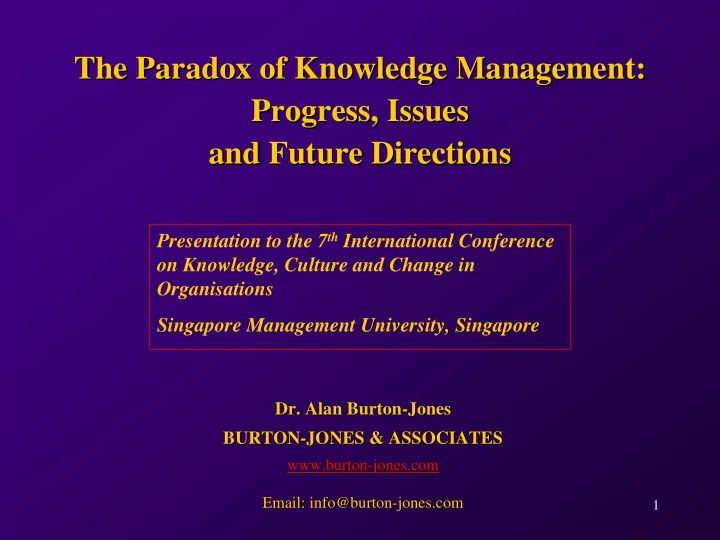

The Paradox of Knowledge Management: The Paradox of Knowledge Management: Progress, Issues Progress, Issues and Future Directions and Future Directions Presentation to the 7 th International Conference on Knowledge, Culture and Change in Organisations Singapore Management University, Singapore Dr. Alan Burton- -Jones Jones Dr. Alan Burton BURTON- BURTON -JONES & ASSOCIATES JONES & ASSOCIATES www.burton- -jones.com jones.com www.burton Email: info@burton- -jones.com jones.com Email: info@burton 1
TOPICS TOPICS Current approaches to KM � � Global KM adoption � The KM paradox � Diagnosing the problems � A framework for future KM 2
CURRENT KM PARADIGMS CURRENT KM PARADIGMS IS- -based based Humanistic IC- -based based IS Humanistic IC Focus People Systems People, systems & other intellectual resources Approx. 70-80% 10-20% 5- 10% Market Share 3
GLOBAL KM ADOPTION: GLOBAL KM ADOPTION: THE GOOD NEWS THE GOOD NEWS � Some notable success stories e.g. Buckman Labs, Xerox � Strong defence sector spending :US Navy reportedly spent over $30 billion on becoming ‘knowledge centric’ � UK: “Whole of Government Knowledge Network” � Signs of a maturing discipline: British Standards Institute, and Australian Standards Association provide KM guidelines 4 Burton-Jones & Associates
GLOBAL KM ADOPTION: GLOBAL KM ADOPTION: THE GOOD NEWS ( continued) THE GOOD NEWS ( continued) � KM ‘tools’ up from 21 st place in 1996 to 8 th place in 2007 based on usage � 69% of leading companies surveyed now using KM tools � Asia-Pacific leading the world - 75% of companies surveyed using KM tools Bain and Company Report, 2007 5 Burton-Jones & Associates
GLOBAL KM ADOPTION:THE GLOBAL KM ADOPTION:THE BAD NEWS BAD NEWS Practitioners losing faith : � CKOs a dying breed in Fortune 500 companies ( APQC) � KM tools rated among the least effective ( BAIN) � Former KM champions giving up e.g. World Bank, BP Amoco Theorists increasingly critical: “…a bewildering but also inspiring concept” ( Sousa and Hendriks, 2006) “ …philosophically naïve” ( Spender and Scherer, 2007) 6 Burton-Jones & Associates
THE KM PARADOX THE KM PARADOX How to explain KM’s simultaneous success and failure? � Major single causative factor: blurring of the conceptual boundaries between symbolic representations of human knowledge and knowledge in people What to do about it? � Inaction not an option: � Managing knowledge critical � Cannot afford to repeat past mistakes 7 Burton-Jones & Associates
HOW DID IT COME ABOUT? HOW DID IT COME ABOUT? � !950’s & 60’s: parallel growth of IT and interest in knowledge as an economic resource � 1970’s & 80’s: the HIP metaphor ( Newell and Simon,1972); PDP/connectionism ( Rumelhart and McClelland,1986) � 1990’s: representational perspectives start to pervade the KM literature: Kogut and Zander (1992), Grant (1996), OECD (1996), Boisot (1998) � mid 1990’s: the IT industry embraces KM: computational/representational approaches become dominant 8 Burton-Jones & Associates
PROBLEM CONSEQUENCES PROBLEM CONSEQUENCES � Overemphasis on knowledge codification � False assumptions of firm ownership and control of knowledge � Unproblematised view of individual and collective knowledge � Knowledge assumed to be convertible and fungible � Unproblematised relationship between knowledge creation and organizational appropriation of knowledge value � Inability to link knowledge to performance 9 Burton-Jones & Associates
HOW TO GET KM BACK ON TRACK? ? Key priorities: Understanding the role of the firm as essentially 1. knowledge-based Understanding the nature of knowledge in an 2. organisational context A framework for KM which integrates IS, HR and IC 3. approaches 10 Burton-Jones & Associates
THE KNOWLEDGE- -BASED BASED THE KNOWLEDGE THEORY OF THE FIRM THEORY OF THE FIRM The raison d’etre for the modern firm : integration of � multiple, disparate, (boundedly rational) knowledge resources � Implications : Management = KM 11 Burton-Jones & Associates
KNOWLEDGE IN KNOWLEDGE IN ORGANIZATIONS ORGANIZATIONS High What we know What we know we know we don’t know ’ ’ ’ Codifiability ’ ’ What we don't know What we don't know What we don't know ’ we know we don’t know Low High Low Certainty 12 Burton -Jones & Associates Burton-Jones & Associates
A FRAMEWORK FOR FUTURE A FRAMEWORK FOR FUTURE KM KM � Role: to support the firm as knowledge integrator � Focus: relationships between people, systems and other tangible and intangible resources � Approach: systems-based/holistic 13 Burton-Jones & Associates
IMPLEMENTING A SYSTEMIC KM IMPLEMENTING A SYSTEMIC KM FRAMEWORK FRAMEWORK Key issues: IS: -How knowledge can be better represented -How representations can be more effectively used HR: -How knowledge can be more effectively shared -How to link people (and HR practices) to performance IC : -How knowledge can be used to create capabilities and routines -How to improve appropriation of value from knowledge 14 Burton-Jones & Associates
SUMMARY SUMMARY KM in a paradoxical state : “bewildering and also inspiring” � Problems largely due to a blurring of the conceptual boundaries � between knowledge and its representations Addressing the problems demands: � � understanding the firm’s role as ‘knowledge integrator’ � understanding knowledge in organizational terms; � a systemic approach to KM 15 Burton-Jones & Associates
16 Any questions
Recommend
More recommend